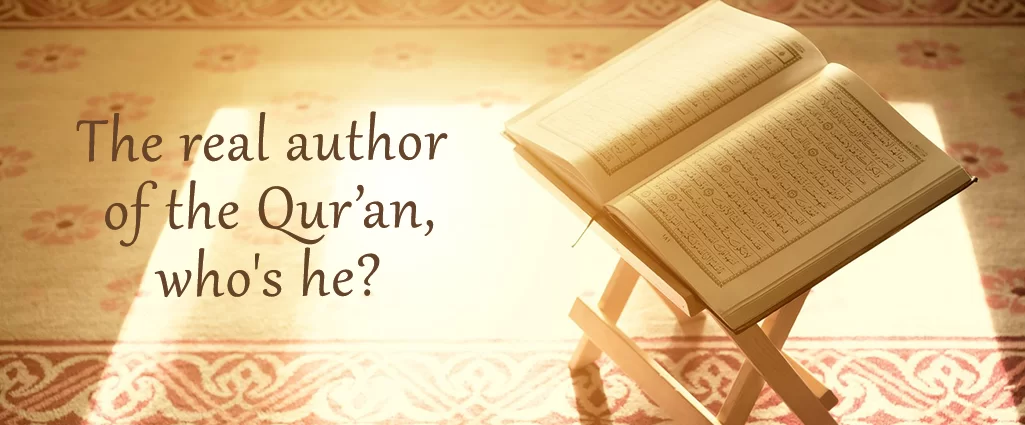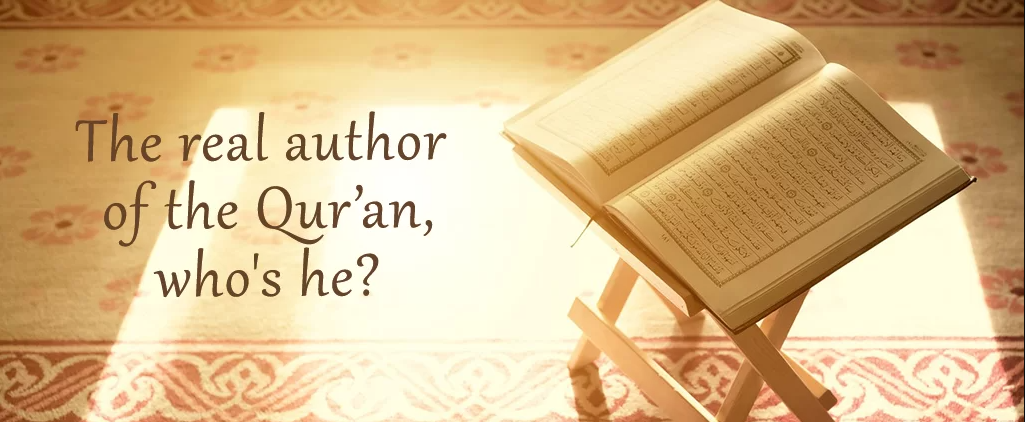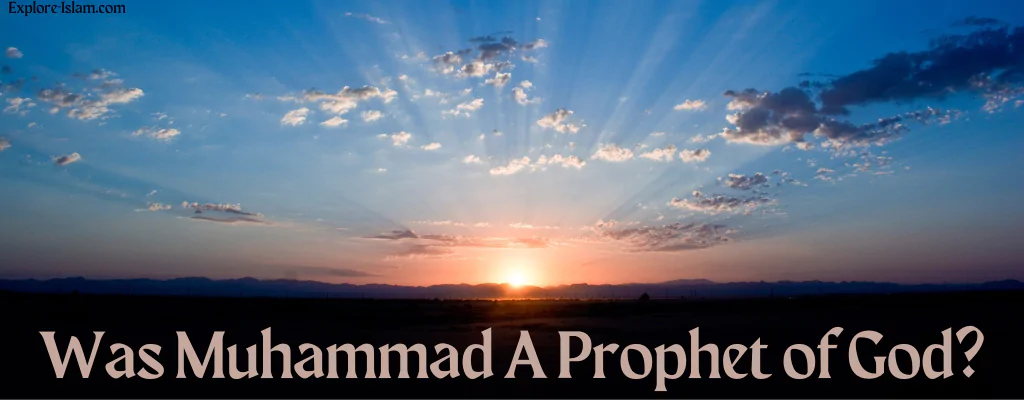You have probably heard of the Holy Book called ‘The Qur’an’! What do you know about it? Perhaps you wonder who wrote the Quran? Is it really divinely sourced? And who is the real author of ‘The Quran’?
In this article, we will answer these questions and discuss the origin of the Quran in detail. We will also criticize and look through all the available possibilities referring to the testimonies of both Western and Arab scholars regarding this topic till we come to an objective conclusion.
Let us start by giving answers to some frequently asked questions about the Qur’an such as: who wrote the Quran? Is the Quran Human-sourced? Does the Quran rely on Biblical sources? Did Muhammad write the Quran? Did the Jews and Christians write the Quran? Did Meccan people write the Quran? And last but not least, did the devil write the Quran?
Who Wrote The Quran?
The question “Who wrote the Quran?” has been a topic of much debate, especially among critics of Islam.
Muslims believe that the Quran was revealed by God to Prophet Muhammad (PBUH), who did not write it himself but conveyed it to his followers.
The Quran was then recorded by scribes during Muhammad’s lifetime, and it was compiled into a book after his death.
Critics, however, have suggested various theories about the origins of the Quran, including the following:
1. Some argue that it must have been written by Muhammad (PBUH) himself
However, this idea is refuted by several key facts, Muhammad (PBUH) was illiterate, and he lived in Mecca, a city far removed from any significant intellectual centers of the time. His life and environment do not support the claim that he could have authored the sophisticated and complex content of the Quran.
2. Some critics propose that the Quran might have been influenced by previous scriptures like the Bible or the Talmud.
However, historical evidence shows that these texts were not available to Arabs in a form that would have influenced the Quran before the time of its revelation.
Additionally, the Quran often corrects and critiques these earlier scriptures, which suggests it was not simply derived from them.
3. Others suggested that Muhammad (PBUH) learned from a well-informed scholar or teacher
This is also unsubstantiated; since Muhammad’s travels, including his trade journeys, did not expose him to enough knowledge to account for the depth and range of the Quran’s content.
Furthermore, historical evidence shows that none of the possible candidates who could have taught him were capable of providing the profound wisdom contained in the Quran.
4. Some radical skeptics have even suggested that the devil could have been the source of the Quran’s knowledge.
However, this idea contradicts the Quran’s own teachings, which consistently warn against following Satan and emphasize that the Quran is a divine revelation.
Ultimately, the Quran’s style and content strongly indicate its divine origin. As stated in the Quran itself, Prophet Muhammad (PBUH) is described as merely a messenger to whom the words of God were revealed.
The Quran challenges humanity to produce something like it, which remains an insurmountable task, further confirming that its true author is God.
It is clear from what we have just discussed that the Quran is authored by no human or external source, it is a divine revelation uniquely distinct in content, style, and historical context. Its linguistic miracles, profound knowledge, and lack of plausible human origin affirm its divine authorship.
Is the Quran Human-Sourced?
Muslims believe that the Quran was revealed to Prophet Muhammad from God, then it was written by the well trusted scribes of Prophet Muhammad. Whereas, some critics argue that human beings wrote the Quran and that it is human-sourced.
However, looking through the Qur’an’s content, we find many sophisticated historical, religious, and cultural references that could be challenging for a human being to know.
Does the Quran Rely on Biblical Sources?
The Quran couldn’t be Biblically sourced as some critics suggested! Gabriel Reynolds, a Christian professor of Islamic Studies and Theology at the University of Notre Dame (USA), wrote a book in 2018 called “The Qur’an and the Bible” in which he tried to argue how the Qur’an discussed, evaluated, and even quoted texts in the Bible, the Talmud, and other ancient writings.
Actually, this claim is not true for several reasons, such as:
- The Bible was first accessible to Arab-speaking people when translated to Arabic, even partially, decades after the death of prophet Muhammad (PBUH).
- Besides, the Talmud was first translated in the 21st century and that was the time when the other writings (such as Apocrypha, manuscripts, and hidden books) were only discovered tens of years ago.
- Moreover, The Quran comments on and corrects the Bible in many verses.
Yet, orientalists still arbitrarily stick to the humanity of the source of the Qur’an!
Who Are the Possible Authors of the Quran?
The source of the Quran was one of the significant debates of Orientalists for centuries; since they don’t believe in supernatural intervention, they had to hypothesize the natural source of such accumulated knowledge.
Orientalists claim that the author of the Quran must be either Muhammad or a well-informed scholar who taught him.
Did Muhammad (PBUH) Write the Quran?
If we contextualize prophet Muhammad (PBUH) and his environment, we would have more insights on this matter and we would reach a solid and convincing conclusion at the end.
Prophet Muhammad (PBUH) was born at the beginning of the 7th century in Mecca. He was illiterate like the majority of Mecca community.
The local tribes used to call him “The Most truth-teller and Trustworthy Person” (Al-Sadiq Al-Ameen). He was raised among Meccan people who were pagans and didn’t have or care about any knowledge of the previous scriptures. This is because they were thousands of miles away from any civilization.
If we review the biography of Muhammad (PBUH), the places he visited, and the people he lived with, we’ll conclude that Muhammad (PBUH) couldn’t be the author of the Qur’an.
We have discussed the above 11 arguments in detail in another article Was Muhammad A Prophet of God? Or He made it up?! I urge you to read the discussion there.
Who wrote the Quran for Muhammad?
Obviously, Muhammad (PBUH) is not the author of the Quran!
Given the Prophet (PBUH) was illiterate, the notion of dedicated study of the non-Arabic books the Hebrew Bible, New Testaments, the Talmud, and other sources that were not yet discovered can’t be a solid argument for the source of the Qur’an.
So, Islam critics don’t depend on this argument. Hence, we are still faced with the other two possibilities i.e. he learned from a well-informed, international, and multi-tongue scholar who accompanied him throughout his life, or the All-Knowing and All-Powerful taught him.
We could agree by now that Muhammad (PBUH) couldn’t be the Quran’s author, but let us elaborate more to know who is the author of the Qur’an. It is important to consider two things when dealing with this point.
Firstly, Muhammad lived in or visited four places throughout his life;
- Bani Sa’idah: Where his wet nurse lived till the age of four.
- Mecca: Where he was raised and lived till the age of 53.
- Syria: Besides, he went on two trade journeys to Syria that took a few months. The first one was with his uncle at the age of 12, while the other was at the age of 25.
- Medina: Finally, he lived in Al-Medina for the last ten years of his life from the age of 53 till 63.
B. The second thing to consider is that the Qur’an was revealed in portions
Throughout the Prophet’s life. From the beginning of the revelation at the age of 40 till his death at the age of 63.
Was The Quran Written By a Meccan Source?
Firstly, let’s see where Mecca is. Mecca lies in the Arabian Peninsula. At the time of the Qur’anic revelation (more than 1400 years ago), It was far away from any civilization. Its people were, as previously mentioned, pagans and illiterate.
For example, Tom Holland, a radical skeptic orientalist, elaborates on the importance of this issue saying:
[The Origin of Islam, a YouTube video at Rancho Mirage]
Meccan people at the time of the Prophet couldn’t find a suitable candidate who could have taught Muhammad
When the Meccans searched for someone who could teach Muhammad (PBUH) in Mecca, they couldn’t find any.
However, two possible men are thought to be candidates; Waraqah Ibn Nawfal and a blacksmith Roman slave.
Did Waraqah Write the Quran?
Waraqah couldn’t have written the Quran. He was a monotheistic Christian scholar who believed in one God and Jesus (AS) as his Messenger.
It is impossible for him to be the author as he first met Muhammad (PBUH) after he had already received the revelation.
Waraqah told Muhammad (PBUH) he would follow him. However, he died a few days after this incident and the revelation continued for 23 years after his death.
Did The Blacksmith Roman Slave Write The Quran to Prophet Muhammad?
The blacksmith Roman slave couldn’t have written the Quran. He was an unqualified, non-Arabic speaker. Moreover, there is no evidence that he had such sophisticated knowledge as that mentioned in the Qur’an.
Being a Roman (let alone being a slave and a blacksmith), does not make you a dictated multi-tongue scholar of Christianity, Judaism, ancient history …etc.
God comments on this claim in the Quran. [Qur’an 16-103]
Did Prophet Muhammad Write the Quran During His Travels?
Muhammad (PBUH) traveled two times on trade journeys. We will discuss both of them in the next few paragraphs.
A. The First Trade Journey of Prophet Muhammad (PBUH) to Syria
The first time was in the company of his uncle at the age of 12. The importance of this journey for Islam critics is that he met there a Jewish monk called “Buhayra”.
This monk hosted the caravan because he saw signs of prophethood written in their scriptures on this group that he later recognized on the young future Prophet (PBUH).
The monk advised his uncle to take him back to Mecca because if the Jews saw him, they would kill him as they did to previous prophets. So, his uncle took his advice and sent Muhammad (PBUH) back.
Some critics may argue that Buhayra was the teacher of Muhammad (PBUH) and that’s not possible for many reasons;
- The meeting didn’t exceed a few hours which isn’t enough for anyone to receive the Qur’an with its detailed references.
- All the people of the caravan attended the meeting and no one accused Muhammad (PBUH) of learning from Buhayra although later on some of them turned out to be his enemies.
- Others on the trip would have learned the same knowledge he gained.
- Muhammad (PBUH) was so young (12 years old) and the revelation started at the age of 40.
- Also, whoever reads the narration of this incident will find that the monk was the questioner and Muhammad (PBUH) was the answerer, not the opposite.
B. The Second Trade Journey of Prophet Muhammad (PBUH) to Syria
The second time was at the age of 25 when he went out as a leader of a commercial caravan. This journey lasted for a few months that were mostly consumed on the way.
History does not include any reference of him learning anything from anyone. Most of the Meccans were traders (for longer periods) who were also not scholars (being a trader doesn’t equal scholar i.e. arguing the contrary would contain bias behind).
For that reason, Islam critics don’t take this journey into consideration while searching for possible sources of the Qur’an because it doesn’t prove anything.
Did Jews and Christians in Medina Write the Quran?
Jews and Christians couldn’t have written the Quran. Muhammad (PBUH) migrated to Medina 13 years after the initiation of revelation, where he met Jewish and Christian people. Some critics argue that Muhammad (PBUH) may have learned from them.
Before making a decision, we have to know the following:
1. Most of the historical events were revealed in Mecca before migration to Medina.
How could they teach him before even seeing him?
2. They sometimes misunderstood the revelation
How come they teach something they cannot understand?
For example, it was narrated on the authority of Udai Ibn Hatim (RA), who is an ex-Christian Muslim. He came asking Prophet Muhammad (PBUH) of Surat Bara’ah (chapter no.9):
“ٱتَّخَذُوٓا۟ أَحْبَارَهُمْ وَرُهْبَـٰنَهُمْ أَرْبَابًۭا مِّن دُونِ ٱللَّهِ…”
“They (Jews and Christians) have taken their scholars and monks as lords besides Allah”. [Qur’an 9:31]
He asked Prophet Muhammad (PBUH): “We did not worship them”. Prophet Muhammad replied, “Didn’t they make some unlawful things -which Allah had prescribed- as lawful, and then you followed them? And they made lawful things -which Allah had prescribed- as unlawful and then you followed them? This is the kind of worship they receive.’”
[Tirmidhi 3095, Tabarani 218 and as-Sunan al-Kubra of Bayhaqi 20137]
3. They used to sit with the Prophet (PBUH) and listen to him.
There were people among Jews and Christians who accepted Islam and others who rejected it despite knowing he was a true Prophet.
For example, Safiyya the daughter of Hoyay ibn Akhtab (a Jewish leader) narrated:
“When the Prophet (PBUH) came to Medina and he stayed in Qiba’, my father and my uncle went to him. They didn’t return till it was sunset. I went to them as I used to do but none of them turned to me out of the grief they had. I heard my uncle asking my father “Is it he (the Messenger we are waiting for)??”, my father answered “Yes, by Allah”, my uncle said “Did you know him?”, he answered “Yes”, he asked “What’s inside you towards him?”, he replied“His Enmity, by Allah, as long as I live.”
4. The Prophet (PBUH) corrected their mistakes
The Qur’an contains many verses that condemn their wrong beliefs and acts.
For example,
“They have certainly disbelieved who say, ‘Allah is the Messiah (Jesus), the son of Mary’ ” [Quran 5-72]
“And the Jews say, ‘The hand of Allah is chained.’ Chained are their hands, and cursed are they for what they say.” [Qur’an 5-64]
5. No historical narration mentions such a thing!
Prof. Dirazz concluded his research on this issue. He said:
[Dirazz, an-Naba’ al-‘Adhim, p. 63]
Did The Devil (Satan) Write the Quran?
Some radical skeptics suggested the devil as the source of the accumulative knowledge of the Quran when they failed to prove the above. It is enough to read the following verses to know whether it is plausible or not:
A devil who tells people to be just, give charity, be good to parents, and never follow the devil, is not a devil!
What Is The Real Origin of The Quran?
The origin of the Quran appears divine. The Qur’an linguistic style suggests there is a superior entity speaking. It orders Muhammad to say he was not more than a man receiving revelation from God. He didn’t hold the benefit or harm for anybody, nor did he know the unseen except through God.
The commands were clear to Muhammad throughout the whole Qur’an indicating his servitude, and the superiority of the Qur’anic source.
The Challenge Of Producing A Similar Book Like Quran
God raised a challenge to humanity to prove the Qur’an is his word. God says in the Quran: “And if you are in doubt about what We have sent down upon Our Servant [Muhammad], then produce a surah the like thereof and call upon your witnesses other than Allah, if you should be truthful.” [Qur’an 2:23]
If you believe this book is authored by Muhammad or any human being, do the following: gather all the human poets and the most eloquent authors and produce a chapter like that of the Qur’an.
What do Western Scholars Say About “Who Wrote the Quran”?
Professor David Thomas, an emeritus Professor of Christianity and Islam at the University of Birmingham said:
[David Thomas et al (eds), Christian-Muslim Relations, pp. 2-3]
What Is The Original Source Of The Quran?
The Quran was written by God Almighty. According to the evidence mentioned above, It is clear there is no other rational possibility of the source of the Quran.
The Quran’s content, linguistic miracle, and superiority suggest it is from God Almighty. God says in the Quran:
“Do they not then reflect on the Quran? Had it been from anyone other than Allah, they would have certainly found many inconsistencies in it.”
[Qur’an 4:82]
God revealed the Quran to Prophet Muhammad (PBUH) throughout his life to convey God’s message of all prophets, teach people, and retrieve the corrupted scriptures.
When God revealed the Quran to Prophet Muhammad (PBUH), he memorized it, and likewise, his companions did. They wrote the Quran down till the Quran was completed by the death of Prophet Muhammad. At that time, the Quran was collected in one book at the time of the first Caliph Abu Bakr.
To Sum Up!
Muslims believe the Quran is sent by God to humanity. According to the evidence above, Prophet Muhammad could not be the source of writing the Quran, nor any of the people he met.
It is obvious that the Qur’an’s content wasn’t authored by Muhammad (PBUH) who was morally elevated and illiterate. And by studying the Quranic verses we would find that it directed its speech to Muhammad (PBUH) as a learner, not an author. Also, by reviewing history we find that he wasn’t taught by any human being.
The whole article showed that the historical context of the Qur’an must be from God, and that’s not the only aspect. The Qur’an’s language is so beautiful and affecting. Its linguistic style is of a high level of eloquence that no one could get anything similar. Try listening.
The Qur’an’s teaching is the strongest evidence it is from God. It says it is a confirmation of the revelations before, and orders us to believe in all Messengers and revelations Allah has sent. It has teachings for purifying oneself, learning about our Creator, the purpose of our life, and the Hereafter.
Additionally, it has flexible rules for organizing our lives starting from the tiny details concerning the small family to the whole society and even the whole world. When are you going to start reading it?
This article in other languages:






